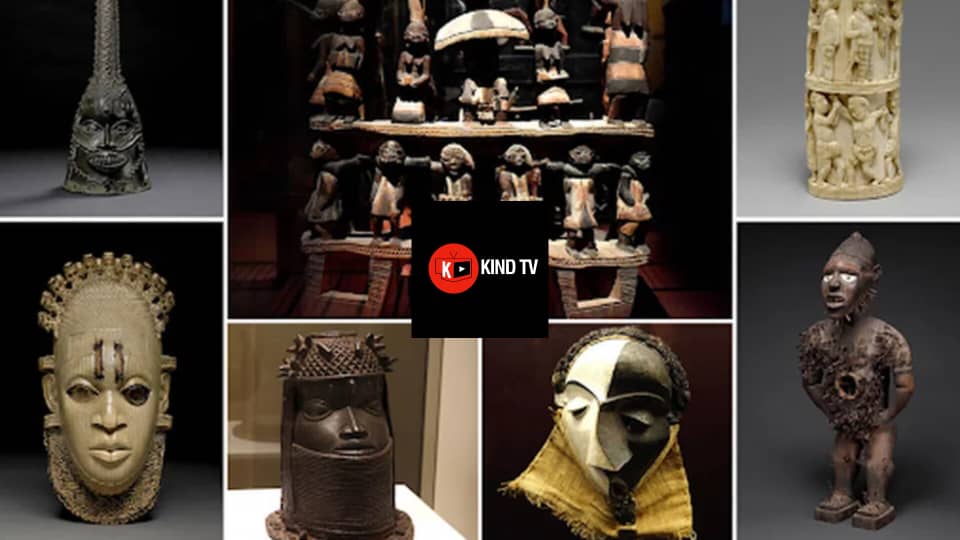Boston Museum Returns Two Historic Benin Bronzes to Nigeria: A Step in Reckoning with Colonial Legacy

In a carefully orchestrated ceremony at Nigeria’s New York mission, Boston’s Museum of Fine Arts officially handed over two priceless Benin Kingdom artifacts to representatives of the Oba of Benin. The event marked a deeply symbolic moment in the ongoing global effort to address the legacy of colonial looting. The treasures in question are a terracotta and iron commemorative head, dating from the sixteenth or seventeenth century, and a sixteenth century bronze relief plaque depicting two officials raising swords. Both items were forcibly removed during the British military expedition on Benin City in 1897. During the handover, the works were presented to Prince Aghatise Erediauwa, acting on behalf of His Royal Majesty Omo N’Oba Ewuare II, the Oba of Benin. The National Commission for Museums and Monuments of Nigeria has been tasked with managing the artworks’ care and coordinating their return to Nigeria. The Museum of Fine Arts described the moment as very significant, emphasizing that the works are being returned to their true and proper owner, not merely as historical objects, but as deeply meaningful cultural and spiritual artifacts. Matthew Teitelbaum, the director of the Museum of Fine Arts, expressed that after more than a decade of custody, the institution felt a profound sense of responsibility and relief in restoring them. The transfer was facilitated by trusted diplomatic and cultural figures, including members of the Museum of Fine Arts board, Nigerian embassy officials, and the Consul General of Nigeria in New York. The path that brought these objects back is complex. The commemorative head passed through the London art market shortly after the 1897 raid, eventually arriving in the United States. The bronze plaque, meanwhile, was sold by British colonial agents shortly after the punitive expedition. Eventually, both pieces were acquired by European collections and later donated to the Museum of Fine Arts in separate instances. This restitution comes not in isolation, but as part of general changes at the Museum of Fine Arts. Earlier this year, the museum announced it would close its Benin Kingdom Gallery. The gallery, which opened in 2013, showcased numerous West African works donated by a private collector. Some remaining Benin Kingdom works are still held by the museum, their provenance has proven more difficult to trace, and research is ongoing. The return is more than a symbolic act. The Benin Bronzes looted in 1897 are potent reminders of colonial violence, from the sacking of the royal palace to the destruction of a sophisticated indigenous civilization. By restoring these pieces, institutions like the Museum of Fine Arts are acknowledging not just the material loss, but the historical injustice that stripped communities of their heritage. For Nigeria and the Edo people, the restitution represents a reclamation of identity and dignity. The National Commission for Museums and Monuments’ leadership has voiced that these returns are not simply gestures, but part of a moral imperative to correct past wrongs. While the return is a powerful gesture, it also raises important practical and ethical questions. Where will these artworks be housed long term? Who will be responsible for their preservation and display? There is ongoing debate about whether they should remain under royal custody or be exhibited in a public national museum. Boston’s action is part of a growing network of repatriation efforts. In recent years, museums across Europe and the United States have begun returning Benin Bronzes, driven by renewed calls for justice and accountability. In Nigeria, the National Commission for Museums and Monuments has reaffirmed the Oba of Benin as the rightful custodian of returned bronzes. Plans are underway for a dedicated Royal Museum in Benin City, though its structure and governance remain contested. Some debate centers on access, transparency, and how best to balance traditional authority with modern heritage institutions. The Museum of Fine Arts’ return of the commemorative head and relief plaque is a watershed moment, not only for the Benin Kingdom, but for the broader global reckoning with colonial era pillage. It is a demonstration that restitution is possible, though not easy, and that museums can evolve towards greater humility and accountability. As these artifacts begin their journey home, they carry with them stories of conflict, resilience, and the enduring cultural life of a people
| 2025-11-18 20:09:16
